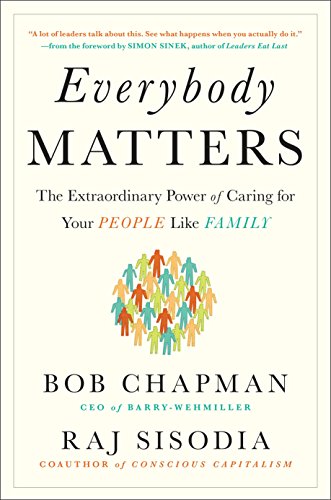Bob Chapman
CEO and Chairman of Barry-Wehmiller Companies
Recently named the #3 CEO in the world in an “Inc.” magazine article and a Top 10 Social Capital CEO by the “International Business Times,” Bob Chapman is very intentional about using his platform as Chairman and CEO of Barry-Wehmiller to build a better world.
He became the senior executive of the organization in 1975 at age 30, when the 90-year-old business had $20 million in revenue, outdated technology and a very weak financial position. Despite the obstacles, Bob applied a unique blend of strategy and culture, and has since led Barry-Wehmiller through more than 115 successful acquisitions and to $3 billion in revenue.
Over the past two decades, a series of realizations led him away from traditional management practices to a people-centric style, which he calls Truly Human Leadership -- an approach with the goal of making team members feel valued, cared for and that they are an integral part of the company’s purpose. At Barry-Wehmiller, there is a unique measure of success: by the way we touch the lives of others.
Bob’s experiences and the cultural transformation he championed were the inspiration behind his “Wall Street Journal” bestseller “Everybody Matters: The Extraordinary Power of Caring for Your People Like Family.” The book is co-authored by Raj Sisodia, founder and co-author of “Conscious Capitalism.”
In 2010, Bob and his wife, Cynthia, launched a nonprofit, the Chapman Foundation for Caring Communities, to bring the company’s groundbreaking Listen Like a Leader training to communities at no charge. And, in 2015, the Chapman & Co. Leadership Institute was founded to bring Barry-Wehmiller’s trademark culture transformation and leadership training to for-profit organizations.
Bob regularly writes about the powerful intersection of people-centric leadership and good business strategy on his blog, TrulyHumanLeadership.com. In 2016, Harvard Business School released a case study illustrating how Barry-Wehmiller applies its people-centric approach to business decision-making.
Bob has a Bachelor of Arts from Indiana University Bloomington and a Master of Business Administration from the University of Michigan. He spent his early career as an accountant with Price Waterhouse.
Social Links
Why We Chose Him:
Bob Chapman is chairman and CEO of Barry-Wehmiller, a capital equipment and engineering consulting firm that owns a whole lot of companies and employs more than 12,000 team members worldwide. Impressive to be sure, but it is his unusual management philosophy that made him stand out to us -- he believes the purpose of a successful company is to make its employees successful.
Assuming control of his family’s company unexpectedly upon the sudden death of his father, Bob began as CEO leading per the traditional model he had been taught at the University of Michigan business school: create shareholder value, manage people, focus on profit. “I did that for many years but, eventually, it felt like something was missing.”
He had already turned around what had been a struggling bottle washer business when he inherited it in 1975. But while reflecting on his success, he had an epiphany: He was not in business for the sake of the company, but the company was in business for the sake of the lives involved with it, not just employees but the community in which a particular plant is located.
Bob has grown what was a single-market company into a far-flung corrugating, packaging, and paper converting equipment and engineering consulting conglomerate of more than 115 acquired companies worldwide that can boast a continuing pattern of compound growth in both revenue and share value. He has accomplished this through strategic acquisition and operational expertise while never deviating from the commitment he expresses to “the lives under my care.”
This goes much further than simply offering people employment. He believes people deserve more than just having a job and getting perks. He believes everyone needs to know that who they are and what they do matters. And he has actually built that imperative into the structure of his company to include open communication, respect, trust, and the pursuit of freedom to act, supported by a framework of responsibility and a desire to always improve. “We now have a new way of defining our success,” Bob says. “At Barry-Wehmiller, we measure success by the way we touch the lives of people.”
He argues businesses today “need to move from a me-centric culture to a we-centric culture,” placing the emphasis on helping people flourish and be appreciated -- specifically not managing them in a way that drags down morale, their lives, their productivity -- within the company and, through the ripple effect of their interaction with their families and then their families with their community, society as a whole.
That’s one of the reasons why, when Bob acquires another company, he doesn’t milk it for the assets and toss out the leavings; he incorporates it into the parent company and welcomes the new employees with the same philosophy.
One of many telling anecdotes Bob shares in his book Everybody Matters addresses the common job insecurity of employees at businesses acquired by another. He was addressing the assembled employees of a new Barry-Wehmiller acquisition and assuring them their jobs were not in danger as he explained the employee-centric culture of his company. It seemed too good to be true to at least one listener, who, incredulous at what she was hearing about plans for the future of her job and her company, turned to the BW executive sitting next to her in the audience and asked if Bob was for real.
Bob shares another story of an employee whose life was turned around through the simple act of listening. “It was a release valve of pent-up frustration,” Bob says, noting that listening is the simplest way to “begin to start” honoring the dignity of others. “Once Steve was listened to and his expertise was utilized, he felt valued. He felt like he was making a difference. He felt like he was worth something. And when his advice was utilized, things in his workday got better. He wasn’t frustrated. He went home fulfilled and happy. He treated his family differently. This is how we can start to heal our brokenness -- by ending the hunger for dignity and sending people home as better spouses, parents, children, friends, and neighbors.”
Through speaking and writing -- not to mention his best-selling book “Everybody Matters” -- Bob continues to be an advocate for this people-first style of leadership, what he promotes in his Barry-Wehmiller University (to which all Barry-Wehmiller employees are welcome to apply) as Truly Human Leadership.
Bob’s goal for Barry-Wehmiller is to foster a dignity-honoring culture that he believes goes deeper than just giving people respect. He actually gives them his cars! There is no doubt that honoring an employee at work is good for morale,but Bob finds ways to make that honor more visible. One way he does this is to hand over the keys to a car from his collection for one full week to the employee being honored for being good stewards of the people-centric culture, and as that employee drives through his or her community to and from work, shopping, visiting friends -- all the errands and outings of everyday life -- he or she can bask in that public affirmation.
“We in business are exacerbating this poverty of dignity in the world because we see people as objects for our success,” Bob says, noting that business leaders, for 40 hours or more a week, have the opportunity to change the world through their decisions, actions, and example. “This is how business can be a powerful force for good, by caring enough about their people that they restore, honor, and protect the sense of dignity that is a basic human need.”
This is the epitome of what we celebrate as Social Capital as we honor this month those leaders who are working to ensure people access to a better life.
Company Name | Tenure at Current Position | Previous Position |
|---|---|---|
| Barry-Wehmiller | ||
Education | Industry | Sub Industry |
| University of Michigan, M.B.A.; Indiana University Bloomington, Accounting |



